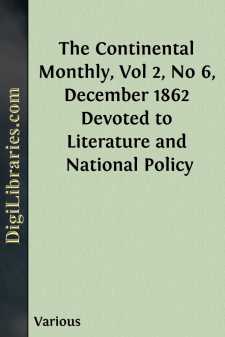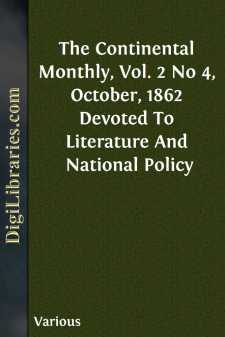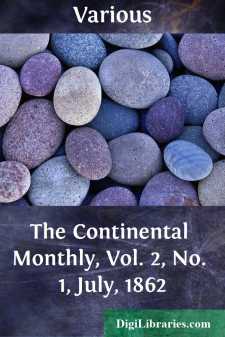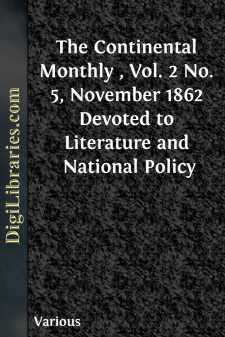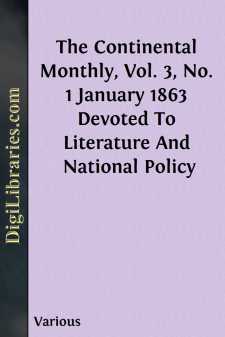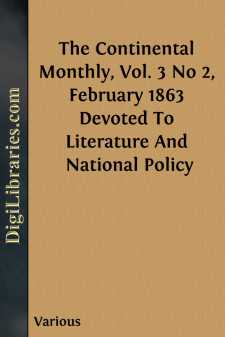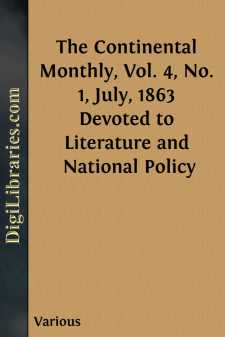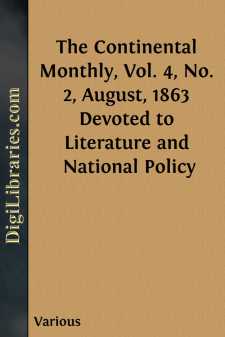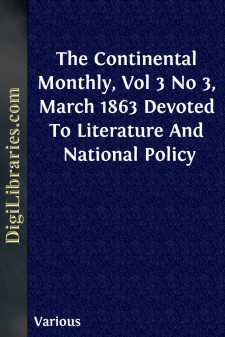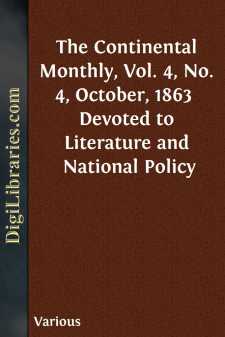Periodicals
- Art 27
- Children's periodicals 59
- Entertainment 5
- Food/Wine 2
- Games/Humor 455
- General 661
- Health 1
- History 53
- House/Home 1
- Regional 62
- Science/Nature 118
- Transportation 10
Periodicals Books
Sort by:
by:
Various
THE UNION. III. On the 10th of April last, upon the recommendation of the President of the United States, Congress offered pecuniary aid to such States as would gradually abolish slavery within their limits. The colonization, from time to time, of the manumitted slaves, with their consent, by the Government, beyond our boundaries, was also contemplated as a part of the system. By the President's...
more...
by:
Various
'THE CONSTITUTION AS IT IS—THE UNION AS IT WAS.' This has been a pet phrase, in certain quarters, ever since the rebellion broke out. The men who use it are doubtless well aware of the prodigious power of such cries adroitly raised. The history of their influence over the unreflecting masses in all ages would be one of the most curious chapters in the history of human nature. The phrase has...
more...
by:
Various
WHAT SHALL BE THE END? If we look to the development of slavery the past thirty years, we shall see that the ideas of Calhoun respecting State Sovereignty have had a mighty influence in gradually preparing the slave States for the course which they have taken. Slavery, in its political power, has steadily become more aggressive in its demands. A morbid jealousy of Northern enterprise and thrift, with...
more...
by:
Various
THE CAUSES OF THE REBELLION. No other nation was ever convulsed by an internal struggle so tremendous as that which now rends our own unhappy country. No mere rebellion has ever before spread its calamitous effects so widely, beyond the scene of its immediate horrors. Just in proportion to the magnitude of the evils it has produced, is the enormity of the crime involved, on one side or the other; and...
more...
by:
Various
THE HUGUENOTS OF NEW ROCHELLE. It is worthy of record that Westchester County, New York, was settled by emigrants from New England and France, and both seeking homes from religious persecutions. As early as 1642, John Throcmorton, with thirty-five associates, made the first settlement in this section, with the approbation of the Dutch authorities. With Roger Williams, driven away from New England by...
more...
by:
Various
OUR NATIONAL FINANCES. Our national finances are involved in extreme peril. Our public debt exceeds $720,000,000, and is estimated by the Secretary of the Treasury, on the 1st of July next, at $1,122,297,403, and on the 1st of July, 1864, at $1,744,685,586. When we reflect that this is nearly one half the debt of England, and bearing almost double the rate of interest, it is clear that we are...
more...
by:
Various
EMANCIPATION IN JAMAICA. The luminous summary of statistical facts published in the March number of the Atlantic Monthly for 1862, has, in a few pages, conclusively settled the question whether emancipation in the smaller islands of the British West Indies has been a success or a failure. It applies the standard of financial results, which, though the lowest, is undoubtedly the best; for the defenders...
more...
by:
Various
OUR FUTURE. In these exciting times, when our country is enduring the throes of political convulsion, and every time-honored institution, every well-regulated law of society seems tottering from the broad foundation of the past, how few are there who ask themselves the question, What is to be our future? For the past two years we have lived in a state of extraordinary and unnatural excitement, beside...
more...
by:
Various
TURKEY. The decline of the Turkish Empire has furnished an eloquent theme for historians, who have ever made it the 'point and commendation of their tale.' Judging from its decline, they have predicted its fall. Half a century ago, the historian of the middle ages expected with an assurance that 'none can deem extravagant,' the approaching subversion of the Ottoman power. Although...
more...
by:
Various
THE FREEDOM OF THE PRESS. An important discussion has arisen since the commencement of the war, bearing upon the interests of the American Press. The Government has seen fit, at various times, through its authorities, civil and military, to suppress the circulation and even the publication of journals which, in its judgment, gave aid and comfort to the enemy, either by disloyal publications in...
more...


